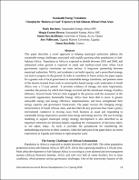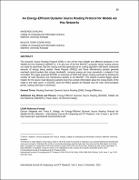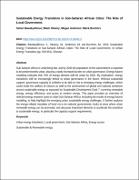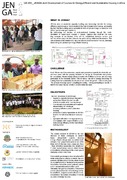| dc.contributor.author | Ndibwami, Alex | |
| dc.contributor.author | Borchers, Mark | |
| dc.contributor.author | Euston-Brown, Megan | |
| dc.contributor.author | Bawakyillenuo, Simon | |
| dc.contributor.author | Batchelor, Simon | |
| dc.date.accessioned | 2018-12-17T08:15:34Z | |
| dc.date.available | 2018-12-17T08:15:34Z | |
| dc.date.issued | 2018 | |
| dc.identifier.uri | http://hdl.handle.net/20.500.12280/1230 | |
| dc.description.abstract | This paper describes a novel approach to helping municipal authorities address the sustainable energy challenges associated with rapidly growing urban populations in Sub-Saharan Africa. Population in Africa is expected to double between 2010 and 2040, and substantial urban growth is expected in small and medium-sized cities where local government capacity constraints are most serious. A long-term partnership between municipal authorities, NGOs, and academics can build capacity, and a prescribed strategy can lead to progress on the ground. In order to contribute to future action, the paper argues for a greater role of local government in sustainable energy transitions and presents some of the lessons learned from work in municipality-based energy work undertaken in South Africa over a 17-year period. It provides evidence of change, but more importantly, considers the process by which that change occurred and the intentional strategy of policy influence. Several South African cities engaged in this process with the assistance of the non-profit organization Sustainable Energy Africa have been able to move to greater renewable energy and energy efficiency implementation and have strengthened their energy capacity and governance frameworks. The paper reviews the changing energy characteristics of South African cities and describes the key processes that create a policy environment conducive to moving away from business as usual and responding to sustainable energy imperatives around clean energy and energy poverty. The use of energy modeling to support municipal energy strategy development is also described as an important informant for decision-makers regarding the consequences of decisions taken, or not taken, today. As such, it provides the groundwork for transferring the methodological process to other countries, while the latter part of the paper draws on recent experiences in Uganda and Ghana in replicating the work. | en_US |
| dc.language.iso | en | en_US |
| dc.publisher | The Center for African Development Policy Research | en_US |
| dc.rights | Attribution-NonCommercial-NoDerivs 3.0 United States | * |
| dc.rights.uri | http://creativecommons.org/licenses/by-nc-nd/3.0/us/ | * |
| dc.subject | Suatainable energy transition | en_US |
| dc.subject | Energy challenges of African urbanisation | en_US |
| dc.subject | Municipalities in sustainble energy transitions | en_US |
| dc.subject | Facility energy transition | en_US |
| dc.subject | Sustainable energy strategy | en_US |
| dc.subject | South African cities | en_US |
| dc.title | Sustainable Energy Transitions: Changing the ‘Business as Usual’ Trajectory in Sub-Saharan African Urban Areas | en_US |
| dc.type | Article | en_US |






